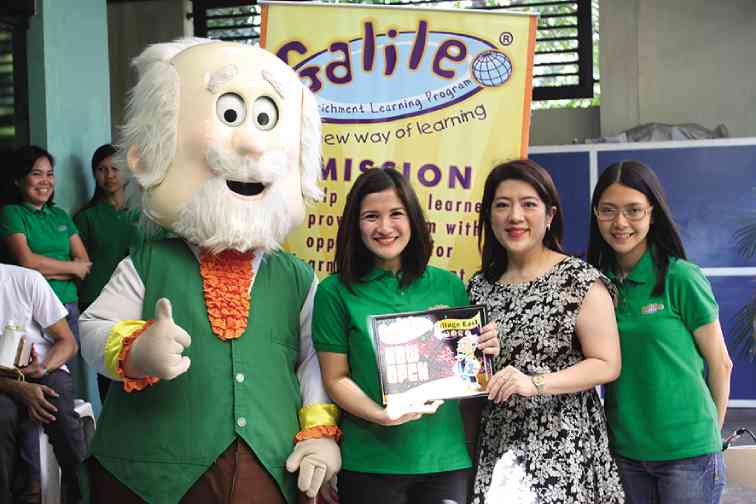In academic venture, AIM alum applies lessons learned

From left, the mascot Professor Galileo with center administrator Camille Prats, Galileo CEO Rowie Matti and Carmela Enriquez
MANILA, Philippines–An entrepreneur found a meaningful way to enrich the lives of students who experienced difficulty in Math and English.
Ma. Rowena J. Matti knows that many Filipinos have difficulty understanding subjects like Math and English. She realized this when she started to help her mother, Rosario Tambunting Juan, run their school—the Sacred Heart School System in Malabon.
Many parents would often inquire about the availability of tutors for their children regarding these subjects.
“Of course, tutorials help students cope with Math and English. But I wanted to address the problem early on. So I thought of building an enrichment school that will tackle the need from a different perspective,” she says.
She describes the system as a “telescopic approach, where we find and focus on the individual learning activities to bring out the star in every child.”
Article continues after this advertisementShe named her school “Galileo,” after Galileo Galilei, the Italian mathematician and astronomer who made significant improvements to the telescope.
Article continues after this advertisementGalileo the institution first opened its doors in 2004. Its goal is for students to improve school grades, become academically competitive, develop a positive attitude toward studying by mixing the element of fun while learning, nurture skills and talents and gain lots of friends.
But for Matti, Galileo’s goal is simply to uplift the quality of education in the Philippines. This is a dream she has nurtured after taking up her master’s degree from the Asian Institute of Management.
The program was tested out at their school in Malabon. Matti started with an assessment of the level of understanding of the learner. She would then determine where the child was having problems so she could zoom in to address his or her needs. After finding the child’s learning needs, a program would be constructed tailor-fit to the child’s specific needs and help the learner move forward.
The program commences after the child’s regular classes and may last up to 45 minutes each session.
How is the program different from the usual tutorial sessions? Galileo makes use of creative and innovative ways to learn. It uses the fun approach—exposing the child to activities such as puzzles, word games and flash cards, Matti explains.
Through her exposure to different schools in the United States, where she took up day-care administration at San Francisco State University, Matti learned that it took more than pencil and paper for a child to learn.
For Galileo, she devised an instructional system where children: Would actively seek to comprehend the world they live in; could learn through play; could exhibit individual differences in the development of their competencies; and could construct knowledge and values through dynamic interactions with peers and adults through active exploration of their environment.
Matti also talks about the methodology used in Galileo. She says there are five ways that people learn.
“We learn through tactile (use of boards, blocks, beads and pegs), worksheets, books and explorations. I want them to understand more than memorize,” she explains.
For her, it is true that it takes a community to teach a child. Matti reaches out to parents and fellow educators.
“We tell the parents to use words of encouragement to their children. Even if they too encounter difficulty in these subjects, still they should tell them that ‘you can do it!’” she adds.
She says these words are not only good to hear but also raise the child’s spirit and give them strength of character. After all, values are important in education.
Ten years after it first opened its doors, Galileo now has over 10 centers nationwide. But Matti points out that this is more than just a livelihood.
“I have to emphasize the fact that it’s more of an advocacy than a business,” she says.
Like any other business, Matti encountered challenges in setting up its unique program. She learned three things from operating Galileo.
“Like any other business, you need to know what you really want out of it. Second, anything that you will start entails hard work and a lot of persistence. Lastly, the accounting part is really hard especially for educators who have very little knowledge of accounting,” she says.
But business has been good for Matti. She has opened Galileo for franchise, but she also makes sure that her partners will be properly screened and well-equipped to handle the challenges of running a business like hers.
“As you grow, you will need people—good people. Strive to get competent partners who share the same attitude and values. Pay your people right and, in our kind of work in education, credibility is very important,” she explains.
Matti derives joy when she learns that her students are learning well and that they enjoy being in Galileo. And of course, she becomes ecstatic when she learns that branches—especially the franchised ones—are earning.
Galileo also teaches Singapore math, which employs an approach that makes the learner master fewer mathematical concepts at greater detail. This also includes the three-step learning process: concrete, pictorial and abstract.
Matti envisions a Philippines with more scientists.
“The country needs more scientists. And scientists are not just good in science, they are expert mathematicians. In this era of technology, math is very important,” she says.
In the future, she dreams of including coding and programming in Galileo’s curriculum.
Enrolment rates start at P1,860 a month. The rate for Singapore math is P2,500 a month. For inquiries, you may reach Galileo’s head office at 8451234 or 5536193.